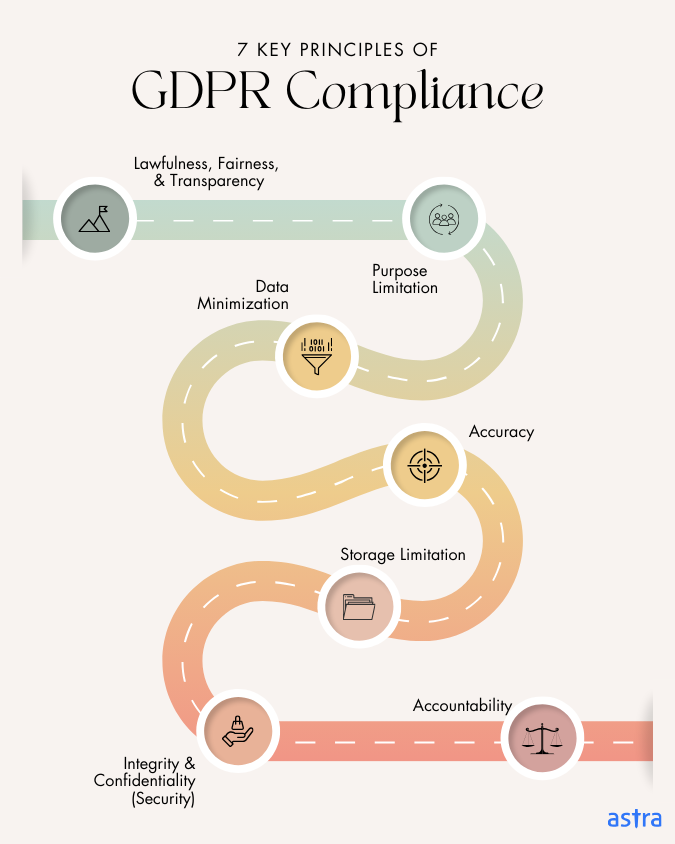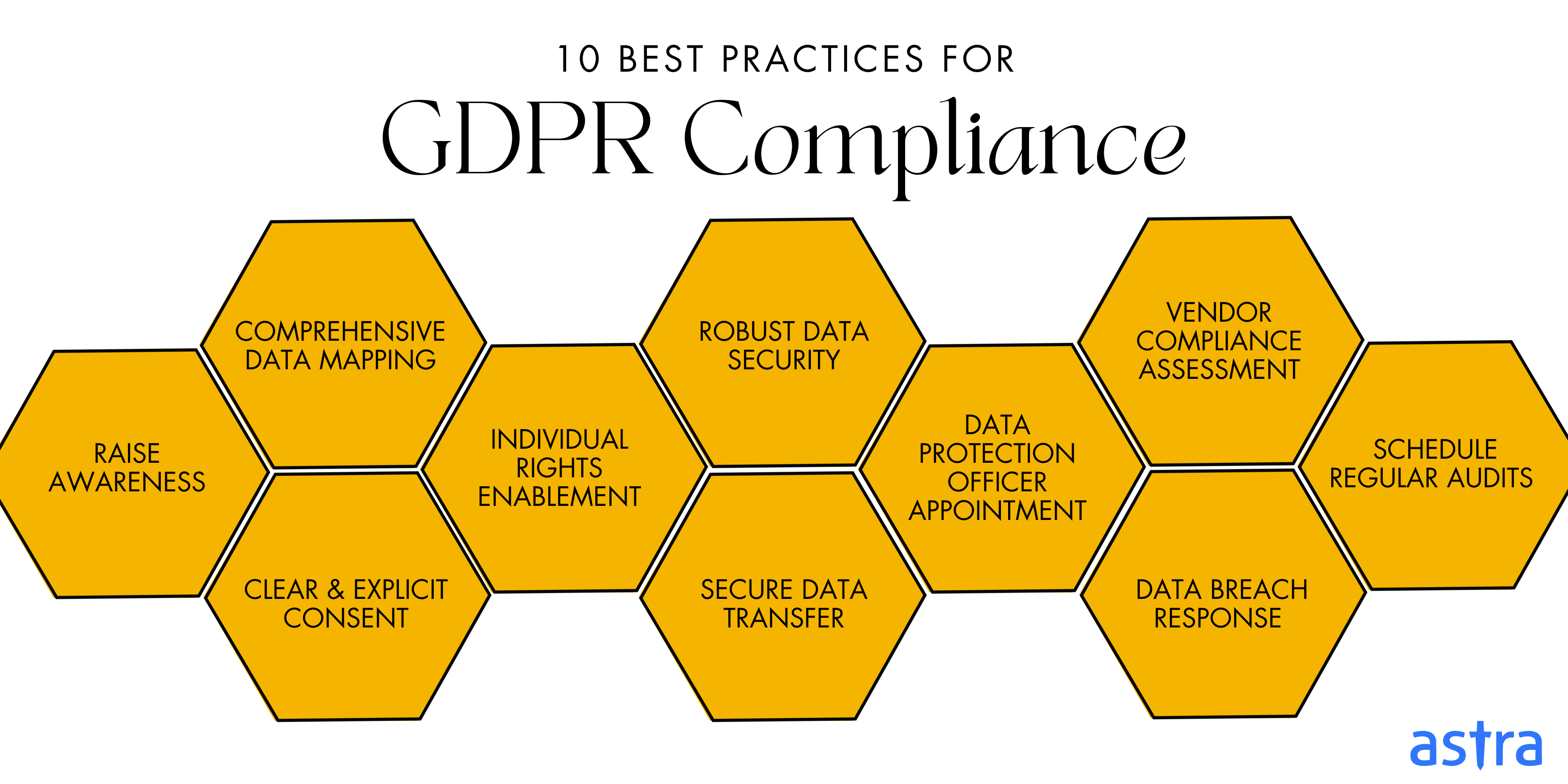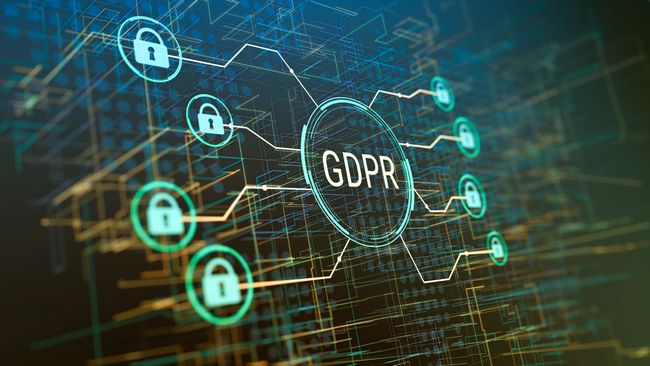Have you ever navigated a bustling city during rush hour? The chaos of traffic signals, lanes merging, and impatient honking—it’s a lot like managing data in the digital world.
Every piece of information is a vehicle. Now, think of General Data Protection Regulation (GDPR) compliance as your traffic police, ensuring a smooth flow without collisions.
But how do you ensure your data traffic follows the rules? That’s where our discussion on the GDPR audit report comes in. It’s a proactive approach to identifying and rectifying compliance gaps before they lead to substantial fines and safeguarding businesses from legal and financial repercussions.
GDPR compliance is the goal, and the GDPR internal audit report is your detailed roadmap.
Let’s decode the digital traffic laws and how to keep your data highway incident-free.
Action Points
- GDPR is a global set of data privacy laws that require organizations to handle personal data responsibly, ensuring privacy and data protection.
- It is guided by seven principles, ensuring data is handled ethically and securely.
- Implement GDPR compliance best practices to ensure your data privacy and ensure compliance.
- Using GDPR compliance software automates and streamlines the audit process.
What is GDPR compliance?
General Data Protection Regulation is a robust set of data privacy laws governing how businesses handle personal data within the European Union (EU). While GDPR is a European regulation, its impact is global. Any organization, regardless of its location, must comply if it processes personal data.
GDPR came into effect on May 25, 2018, marking a significant milestone in data protection regulations and reshaping how organizations worldwide manage and safeguard personal data.
GDPR compliance is like a set of rules for businesses using digital data. It ensures they handle your personal information responsibly, protecting your privacy. You can think of it as a digital code of conduct, making sure companies play fair and keep your data safe.
What kind of information does the GDPR compliance apply to?
- GDPR applies to any personal data, broadly defined as information relating to an identified or identifiable person.
- This includes names, email addresses, social media posts, IP addresses, and even genetic or biometric data.
- The regulation ensures stringent protection and responsible handling of such information, promoting individual privacy and data security.
Why is Astra Vulnerability Scanner the Best Scanner?
- Runs 8000+ tests with weekly updated scanner rules
- Scans behind the login page
- Scan results are vetted by security experts to ensure zero false positives
- Integrates with your CI/CD tools to help you establish DevSecOps
- A dynamic vulnerability management dashboard to manage, monitor, assign, and update vulnerabilities from one place.
- Helps you stay compliant with SOC2, ISO27001, PCI-DSS, HIPAA, etc.
- Integrates with Slack and Jira for better workflow management
- Trusted by the brands you trust like Agora, Spicejet, Muthoot, Dream11, etc.

7 Key Principles of GDPR Compliance

Image: 7 key principles of GDPR compliance
1. Lawfulness, Fairness, and Transparency:
You must process data lawfully, fairly, and transparently. For instance, informing customers clearly about data usage, like email newsletters, ensures compliance, and builds trust between you and your clients.
2. Purpose Limitation:
Only collect data for specific, explicit purposes you’ve informed users about. For example, gathering addresses solely for shipping purposes ensures data isn’t misused, respecting the users’ privacy.
3. Data Minimization:
Collect only the data you need for the stated purpose. It means if you’re asking for birthdates for age verification during online purchases, make sure it respects user privacy and GDPR guidelines.
4. Accuracy:
Ensure the data you hold is accurate and up-to-date. For instance, updating customer addresses promptly prevents misdelivery, enhancing your service reliability and compliance with GDPR’s accuracy principle.
5. Storage Limitation:
Don’t store data longer than necessary. For example, deleting inactive user accounts after a specific period ensures compliance. It not only frees up storage but also respects users’ right to have their data erased.
6. Integrity and Confidentiality (Security):
Protect data with appropriate security measures. Encrypting customer passwords, for instance, prevents unauthorized access, ensuring both data integrity and confidentiality, thereby fulfilling GDPR security requirements.
7. Accountability:
Be accountable for your data processing activities. For example, publishing a privacy policy outlining data practices demonstrates transparency. It builds trust with users, showcasing your commitment to GDPR compliance and data protection.
GDPR Audit Report
A GDPR audit report is a comprehensive document that outlines an organization’s adherence to the General Data Protection Regulation standards. It details the assessment process, compliance status, and areas needing improvement.
The report typically includes:
- Introduction: Background, scope, and objectives of the audit.
- Audit Methodology: Explanation of the audit process, data sampling, and assessment criteria.
- Data Mapping: Detailed analysis of personal data flows within the organization.
- Compliance Assessment: Evaluation of practices against GDPR principles like data security, consent, and individual rights.
- Gap Analysis: Identification of areas where current practices do not align with GDPR requirements.
- Risk Assessment: Evaluation of potential risks and their impact on data protection.
- Recommendations: Actionable suggestions to enhance compliance, improve processes, and mitigate risks.
- Action Plan: Step-by-step plan outlining tasks, responsibilities, and timelines for implementing recommendations.
- Conclusion: Summary of findings, emphasizing the organization’s strengths and areas needing attention.
- Appendix: Supporting documents, data samples, and additional information.
A well-prepared GDPR audit report is essential for demonstrating compliance, identifying vulnerabilities, and ensuring robust data protection practices within an organization.
You can download a sample pentest report designed to give you an idea of how vulnerabilities are reported and their impact score.
10 GDPR Compliance Best Practices

- Raise Awareness: Educate your team about GDPR’s principles and impact on your organization.
- Comprehensive Data Mapping: Identify and document all personal data you process.
- Clear and Explicit Consent: Obtain clear and explicit consent for data processing activities.
- Individual Rights Enablement: Enable processes for data access, correction, and deletion upon request.
- Robust Data Security: Implement robust security measures, such as encryption and regular security assessments.
- Secure Data Transfer: Ensure secure cross-border data transfer mechanisms, like Standard Contractual Clauses.
- Data Protection Officer: Appoint a Data Protection Officer (DPO) if necessary.
- Vendor Compliance Assessment: Assess the GDPR compliance of third-party vendors handling your data.
- Data Breach Response: Develop a clear procedure for reporting and managing data breaches.
- Regular Audits: Conduct audits regularly to obtain GDPR audit reports and assessments to maintain ongoing compliance.
By following these steps, your organization ensures privacy, complies with laws, and protects against legal issues, securing a trustworthy reputation.
Why do You Need GDPR Compliance Software?
Now, for a seamless GDPR internal audit report, you need frictionless compliance software. It streamlines the audit process and ensures accurate, efficient, and comprehensive reporting.
Here’s why you need it:
- Automation: Simplify tasks and reduce errors
- Centralized Data: Streamline tracking and management
- Real-time Monitoring: Swift response to compliance issues
- Customization: Tailored to unique business needs
- Efficiency: Streamline audit procedures, saving time
- Accuracy: Ensure precise compliance adherence
- Documentation: Maintain meticulous records for regulatory transparency
3 best GDPR compliance software in 2024
| Name of GDPR Compliance Software Provider | Key Features | Demo Availability | G2 Rating (out of 5) |
| Astra Security | Dashboard and Reporting | Yes | 4.9 |
| AuditBoard | Advanced reporting and analytics | Yes | 4.7 |
| Transcend | Compliance reporting and audit log management | Yes | 4.6 |
Conclusion
By 2026, Gartner predicts fines linked to mishandling data will surpass $1 billion. In light of this alarming prediction, the GDPR audit report has never been more crucial.
At the nexus between compliance and security lies penetration testing for GDPR compliance. It should occur at least annually, yet frequency can vary based on factors like compliance needs, policy changes, new infrastructure, and risk tolerance.
Penetration testing contains a detailed analysis of the vulnerabilities, bugs, and flaws uncovered during the security test. Getting a pentest done to find and fix all the loopholes in your business is the next obvious step.
Astra helps you achieve GDPR compliance by protecting personal data from hackers and providing security audits and reports. Win customer’s trust with a unique, publicly verifiable security certificate. Stay ahead of the compliance curve with Astra.
FAQs
Are GDPR audits mandatory?
Yes, GDPR audits apply to all organizations European Union (EU) and non-EU, that process the personal information of European citizens. An example of that would be a company from India that collects data from EU citizens.
How often should I conduct a GDPR audit?
The frequency of GDPR audits depends on your organization’s complexity and data processing activities. You can conduct audits annually or whenever there are significant changes in data processes, ensuring continuous compliance.
Who performs GDPR audits?
GDPR audits are typically performed by data protection authorities in EU member states, internal compliance teams within organizations, or external audit firms specializing in data protection and privacy compliance.
What are the GDPR fines for non-compliance?
GDPR fines for non-compliance can be substantial, up to 4% of the company’s global annual revenue. The exact amount depends on the severity and nature of the violation. Authorities assess fines case-by-case.
















